A journey through the refugee crisis on the Greece-Turkey border
Asylum seekers, villagers and vigilantes share their stories as tensions grow along the border.
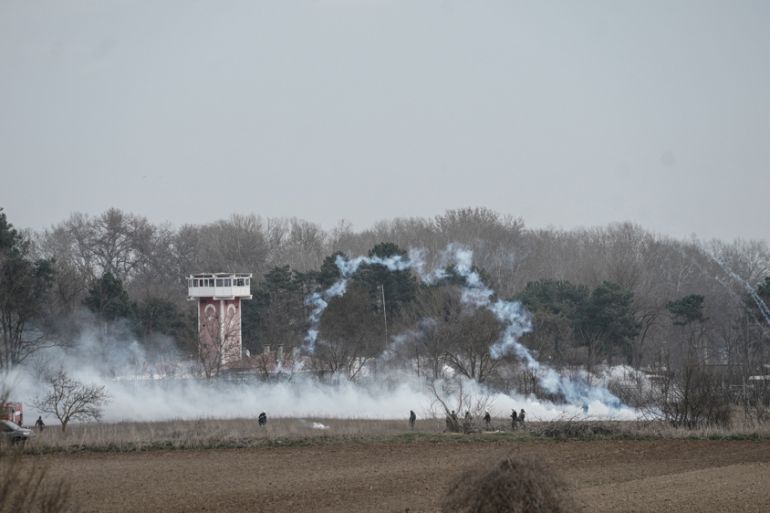
Evros, Greece – Witnesses told reporters the bullet that killed 42-year-old Muhammad Gulzar came from the Greek side of the border, but whether a soldier, a police officer or a carbine-toting vigilante had pulled the trigger, no one could say for certain.
It was March 4, and clashes had erupted in the no man’s land spanning the border between Turkey and Greece. Here in Kastanies, the border crossing was closed to civilians. Every now and then, an olive truck full of soldiers bounced down the crater-pocked road leading into the restricted military area on the frontier. Greek riot police officers and soldiers formed columns across the field. On the other side of the border fence, behind an ominous barrier adorned with curls of concertina wire, thousands of refugees and migrants had amassed. Their hopes of entering Europe were dashed by the tear gas, water cannon and flashbangs that greeted them.
Keep reading
list of 4 itemsBeyond borders: Migrants online
Tunis police raid sees refugees abandoned near the border with Algeria
‘No turning back’: Carnation Revolution divides Portugal again, 50 years on
Grey clouds formed above like clenched fists in the skies. “Freedom,” the refugees and migrants chanted, gripping the fence’s chain links. Greek riot police fired tear gas over the fence, streaks of chemical smoke briefly scarring the air and then dissolving. A tear gas canister would occasionally land on the Greek side, either returned by a protester or fired by Turkish police. A police vehicle lurched forward, showering the protesters with powerful streams of water. A helicopter buzzed above, and what sounded like a burst of gunfire echoed in the fields.
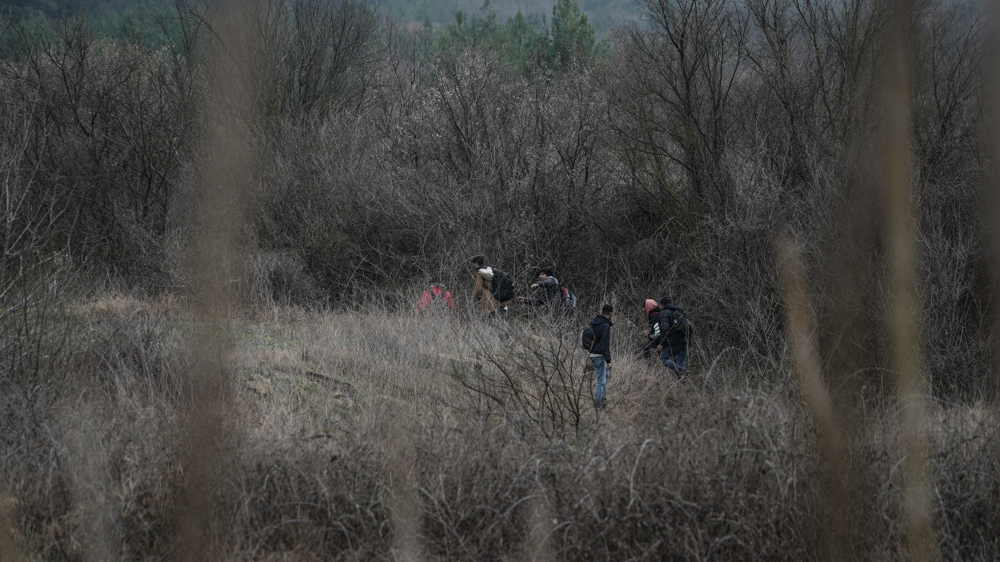
Along with a few dozen reporters, I stood atop the railway tracks on a hilltop that overlooks the borderlands. Some scribbled in their notepads, a few did live broadcasts on camera, and others jostled for the best spot to snap photos. There, we watched the clashes unfurl a few hundred metres away, a cat-and-mouse game that groaned on well into the afternoon.
Mulling around among the reporters was Argyris Papastathis, deputy head of Greek Prime Minister Kyriakos Mitsotakis’s press office. He would not grant interviews, but he insisted that Greek forces were not firing live ammunition, dismissing the reports as “fake news”. Meanwhile, images of apparent gunshot victims were cropping up all over the internet. Papastathis led us into the closed military area, allowing us to stand some 100 metres (328 feet) behind the last row of riot police and soldiers. “Look how they are calm now that journalists are here,” he said. “That’s because they want you to think they are refugees.”
‘Four years of friendship’
Later that night, 920km (572 miles) away in Athens, Qaiser Rizvi was sitting at home with his cousin, Irfan Zaidi, when he received a message from Muhammad Gulzar’s Facebook account. Sent by Gulzar’s wife, it was a link to a Sky News television report about live gunfire on the Greek-Turkish border. The segment showed a crowd of refugees and migrants carrying a body shrouded in sheets. Then the frame switched to a woman crying on a curb outside a hospital in Turkey. “She is the wife of a man called Gulzar,” the reporter said. “He was the one hit in the chest.”
Thirty-three-year-old Rizvi and Zaidi, 35, had met Gulzar four years earlier at the Pakistani embassy in Athens. The three later lived together at City Plaza, a now-shuttered squat that provided housing to hundreds of refugees and migrants at a time. At night, the cousins would often go to Gulzar’s room, number 611, where they would trade jokes and watch videos on their phones. Unlike most of the asylum seekers at the squatted hotel, Gulzar had already lived in Greece for several years, working odd jobs in home renovation, welding and automotive repair, among other things, Rizvi told me a week later in Athens.
Gulzar worked long hours, spoke Greek fluently and was very funny, his friends said. Sometimes, though, he would chide Rizvi and Zaidi, urging them to go out and search for work rather than pass time in the squat, the pair said. Gulzar was trying to fix his residency documents late last year when he travelled back to Pakistan to visit his parents, who were ageing and ill. While in Pakistan, he married. Along with his new wife, he travelled back to Turkey with the hope of re-entering Greece.
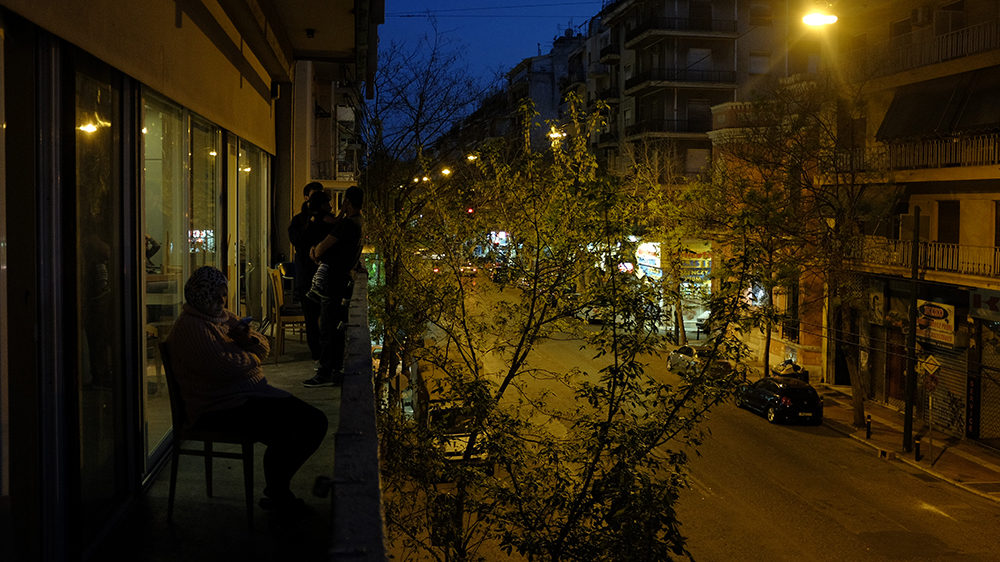
As Rizvi and Zaidi watched the video and the pieces came together, they both broke down in tears. All week long, Rizvi had been exchanging Facebook messages with Gulzar. “I couldn’t believe Gulzar was dead,” he told me, lifting his telephone to show pictures of gunshot wounds on Gulzar’s chest and knee. “We had four years of friendship.”
“He spoke Greek very well, and he knew everything here,” said Zaidi, whose asylum application was rejected two days before his friend was killed.
‘Invasion’
Already hosting close to 4.1 million refugees, Turkey ordered its border guards to stand down on February 27, as the country braced for another wave of refugees expected to be displaced by the ongoing battle in Idlib, a flashpoint city in neighbouring Syria.
The Greek government has decried the bottlenecking of refugees and migrants as an “invasion” and suspended asylum applications for a month. On March 3, Greek Prime Minister Mitsotakis said his country faced an “asymmetrical threat” as the last line on the European Union’s southeastern periphery. “This is no longer a refugee problem,” he told a news conference while touring the border region with European Council President Charles Michel, European Commission head Ursula von der Leyen, and European Parliament head David Sassoli. “This is a blatant attempt by Turkey to use desperate people to promote its geopolitical agenda and to divert attention from the horrible situation in Syria.”
On that trip, von der Leyen thanked Greece for its tough stance on the EU’s external border and described the country as Europe’s “shield”. Frontex, the EU’s border agency, said it would send more officers and equipment to reinforce Greek security forces on the border.
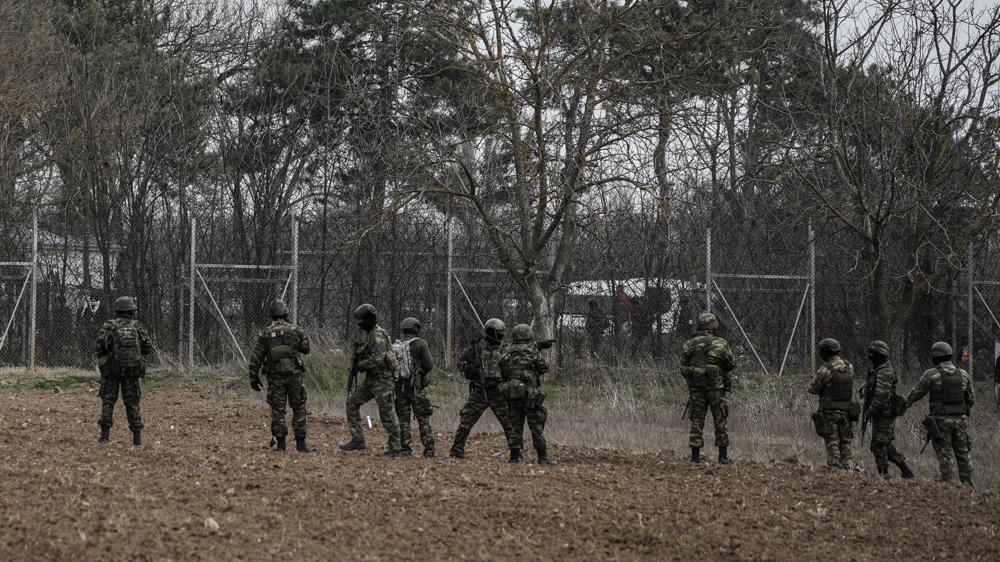
Meanwhile, Greece has deployed more soldiers and police officers to the border, where it hopes to sever the flow of refugees and migrants into the country. As arrests and pushbacks swell, people continue to risk the journey.
Driving down the road that connects a string of border villages to a national highway, we spotted two young men walking on the grassy shoulder. Shortly after we reached the end of the road and turned around, a group of soldiers and police officers appeared. Blue-and-red lights flashed. The two asylum seekers sat on their knees in the yellow, hip-high grass, their hands behind their heads. A police officer turned our way and scowled. “No photos,” she shouted.
For its part, Turkey has announced plans to prepare a case against Greece in the European Court of Human Rights and has called on EU leaders to update the March 2016 migration accord, a deal which allocated billions of Euros in funding to Turkey in exchange for preventing refugees and migrants from embarking for Europe. “It is not only about keeping migrants in return for more money,” Turkish Foreign Minister Mevlut Cavusoglu told the state-run Anadolu news agency on Tuesday, reiterating his government’s demand that the EU grant Turkish citizens visa-free access and update the customs union between Turkey and the EU.
‘Racist and violent behaviour’
In 2015, Greece was still entangled in a brutal economic crisis and the left-wing Syriza party surged in January legislative elections on promises to abolish European-backed austerity measures and, among other drastic changes, introduce more humane migration policies. During the summer of that year, however, the refugee crisis exploded in the Mediterranean Sea, bringing hundreds of thousands of people to the country. Fleeing war and poverty, most new arrivals continued onward to Western Europe.
The Syriza-led government struggled to manage the flow, despite billions in European funding. In early 2016, governments around Europe sealed their borders, and in March of that year, the EU and Turkey reached the deal designed to hinder the flow of new arrivals to the continent. Arrivals slowed down for a time, but desperate people continued to brave land borders and board flimsy dinghies bound for Greek islands. With Greece situated on Europe’s external border, tens of thousands of people wound up stranded in the country.
Over the years that followed, Greek voters grew increasingly frustrated with the Syriza-led government’s migration policies, including a measure that prevented asylum seekers from leaving the islands hosting refugee camps until their applications were processed. In snap elections last July, the right-wing New Democracy party removed Syriza after campaigning on a platform that included promises to enact a heavy-handed crackdown on migration to the Mediterranean country.
The New Democracy government made plans to escalate deportations and gutted asylum seekers’ rights, but new arrivals climbed again in late 2019. By the end of the year, more than 74,000 people had reached Greece, according to the United Nations refugee agency (UNHCR), bringing the total number of migrants and refugees in the country to an estimated 112,000.
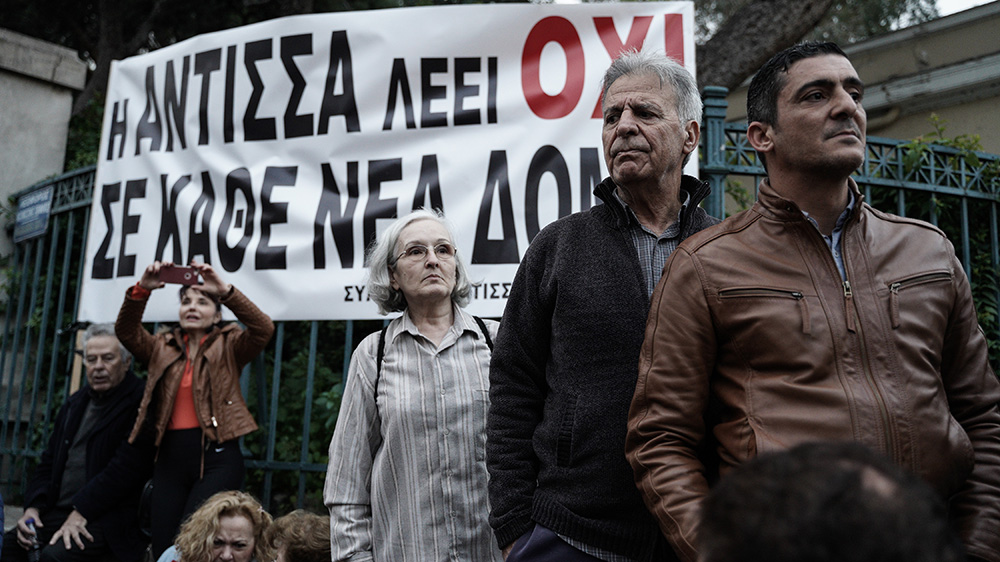
Even as police beefed up border security, attempted to transfer more asylum seekers from the islands to the mainland, and evicted refugee squats in Athens, locals in communities around the country grew increasingly frustrated. Vigilante violence and anti-refugee protests surged. On several islands, local mayors and other municipal officials led mobs of residents that blocked boats from unloading refugees on their shores. In late October, locals in the northern village of Vrasna blockaded the street and prevented buses carrying hundreds of refugees from entering the community.
Deputy Migration Minister Giorgos Koumoutsakos insisted that the government is examining “all possible measures” to clamp down on new arrivals. “For the government, managing of borders and securing borders is a top priority,” he told me.
Last month, the government announced plans to build closed detention centres on five Aegean islands – Chios, Kos, Leros, Lesbos and Kos – and islanders rebelled. On Chios and Lesbos, locals stormed construction sites, rioted and clashed with hordes of riot police that the government had shipped to the islands. In the weeks that followed, attacks on asylum seekers, humanitarians and reporters mounted.
The plan’s announcement followed revelations that the government would build a floating border wall in the Aegean Sea, a 2.7km (1.7 miles) barrier intended to prevent refugee boats from reaching Lesbos.
As misery deepens and the clampdown grows more severe, surveys suggest that Greek public opinion has shifted: in a recent poll, 92 percent of respondents told the diaNEOsis Research and Policy Institute that too many migrants were in the country, while only one-in-five believed that migrants should be integrated into the society.
Vice President of the European Parliament Dimitrios Papadimoulis, a member of Syriza, blamed the government for the anti-refugee uproar. “Greeks were always inspired by the values of solidarity, empathy and compassion for the weak,” he told me, but “lately, the rhetoric legitimised by different members of the government … has justified several incidents of racist and violent behaviour against immigrants and NGO [workers].”
In Evros, the region that abuts the country’s land border with Turkey, locals were not immune from the wave of vigilantism washing over Greece. Since the crisis on the land border flared up, civilian patrols – among them armed groups, including those led by acolytes of the neo-Nazi Golden Dawn party – fell into the spotlight.

‘Locals started to feel edgy’
Home to an estimated 150,000 people, the Evros regional unit includes five municipalities and spills across some 4,240 square kilometres (1637 square miles) of mostly flat land touching Greece’s borders with Bulgaria and Turkey. For most of its length, the Greek-Turkish border traces the Evros River down to the delta that delivers its waters into the Aegean Sea.
Nowadays, if you drive up and down any of the roads near the border with Turkey for long enough, you will spot refugees and migrants trudging across patches of open field, lugging knapsacks and weighed down by the mud accumulating on their shoes like an anchor. In the predawn hours, before the sun has fully ascended, they appear like apparitions on the hilltops, shrouded in the morning fog that affords them a modicum of anonymity. When a rickety police van or bulky army vehicle lurks past, the asylum seekers tear off for the trees or dive into the bushes.
After the clashes in Kastanies died down on March 4, we drove to Pythio, a decaying village crawling up a hillside on the border. Sitting just a few kilometres from Evros River, which separates Greek from Turkish territory, the village is home to a few hundred people. They live between the ruins of a pre-Byzantine castle, a scatter of shops that are rarely open, and a handful of cafes shedding paint and bearing faded signs.
There, we found Antonis Polisakis playing cards in a coffee shop where he holds court all day. A pair of men sat in the corner, smoking, while an action movie played on a television fixed to the wall. Polisakis farms cotton and sunflower on land that huddles up to the borderline. At 51, he has lived his entire life in Pythio, a village he says struggles to keep its youth from leaving in search of work and opportunities elsewhere. Locals recently elected Polisakis president of the village, a largely symbolic, part-time job that he manages between farming and passing his days in the cafe.
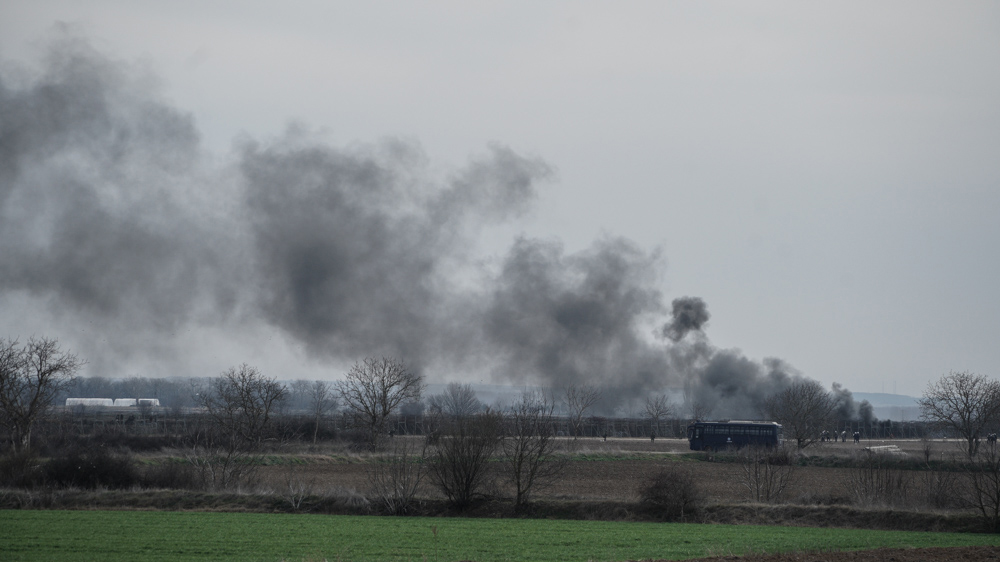
Four nights before we met, Polisakis opened Facebook and found a post that announced that a group of refugees and migrants had entered the village. Altogether, there were some 400 asylum seekers, he told me. Police rounded up about half of them at the local church and transferred them to holding centres, but the rest managed to escape under the cloak of darkness. “It was nothing new,” he said, “but the numbers were alarming. Of course, when we saw the constant flow of people locals started to feel edgy.”
For years, locals have hoped that the Greek authorities would eventually assert greater control of the border, he said, but little has changed through successive left-wing and right-wing governments. Worried by the recent build-up on the Turkish side, Polisakis and other locals recently obtained permission to carry out civilian patrols they say will support Greek security forces that are stretched thin along the frontier. “If they [the Greek government] wanted to solve this whole problem, they would let the hunters and farmers protect their own lands,” he said, “but they don’t even let them access their own lands [on the border].”
In a village whose population is largely made up of ageing farmers and pensioners, locals fear the government could eventually build the type of closed detention centres authorities are currently erecting in other parts of the country. “If the village has 300 [refugees] here, how will they feed them?” Polisakis asked. Although not hopeful, he insisted that other European countries should take a larger share of the asylum seekers, a point of contention also regularly voiced by the Greek government. “Europe needs to open the borders and let them pass through.”
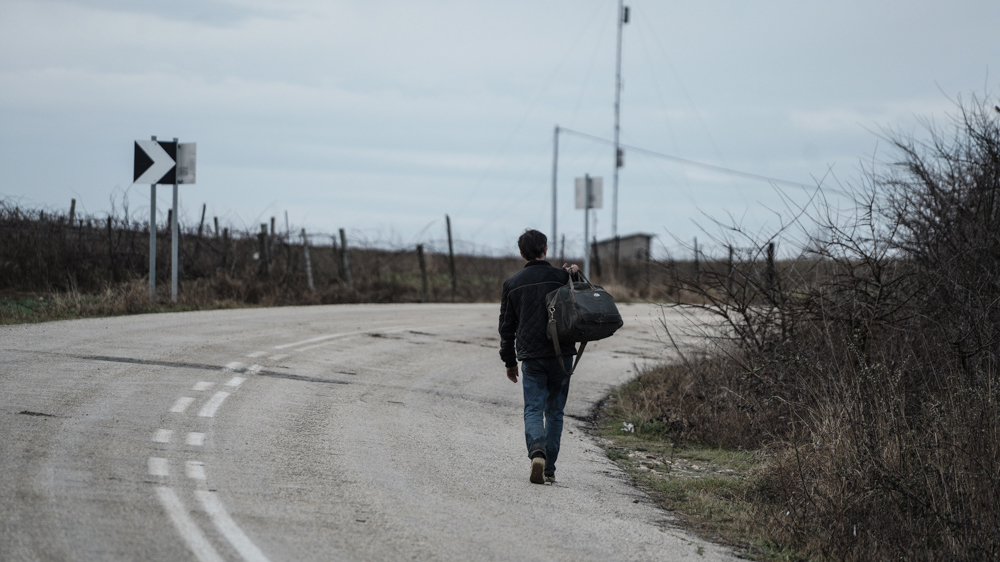
‘So much hate’
About 9:30pm on March 2, CNN Greece journalist Kostas Pliakos hopped in his rental car and started the drive from Didymoteicho to Feres, a 65-kilometre (40 miles) trek down the border. About halfway there, he spotted three men on the side of the road and pulled over. He introduced himself and asked where they were from. Syria, they told him. As he chatted with them, a pick-up truck skidded to an abrupt stop.
When two men and a woman hopped out, Pliakos noticed one was carrying a rifle. Pliakos asked what they were doing there, and they said they lived in nearby villages and patrolled the fields for refugees and migrants. Then two more pickups pulled up, and more armed men appeared in front of him.
Understanding that they stood face-to-face with vigilantes, the Syrians took off in a sprint, Pliakos told me. One man fired the rifle into the air, the sharp crack of the gunshot rippling out in the night. Two of the Syrians escaped, but the vigilantes caught the third, tossed him to the ground, and punched and kicked him. Standing some 10 metres away, Pliakos watched the violence unfold until one of the vigilantes accused him of filming the attack on his phone. He admitted that he was a reporter, but insisted that he was not filming. It was no use: the men snatched his telephone and threw it on the ground.
Even as he watched his phone shatter into pieces, Pliakos assumed he was safe – until the first fist slammed into his face. He tried to defend himself, but tumbled. As the three or four men punched him, kicked him, and struck his body with a wooden stick, no cars passed. “You f***ing journalist,” one shouted. “We are trying to defend our communities and you do this stuff here.”
By the time the beating ended, Pliakos had a black eye and his arms and legs were blanketed with bruises and scrapes. Two days before, a mob had set upon a German journalist, Michael Trammer, at the Thermi port on Lesbos Island’s northern shore. They knocked him to the ground, beat him, and threw his equipment into the sea. Throughout the week leading up to that incident, similar groups on Lesbos beat freelance reporters, busted up their cars, and told them to leave the island. Although attacks on the press are not new in Greece, the recent uptick left him stunned. “I don’t remember in my career so much hate against journalists,” he said.
‘You can’t be here’
On the morning of March 5, the day after Gulzar died on the border, Greek media reports said the refugee build-up was moving further south, towards Ipsala – the same area where Turkish authorities claimed a Greek bullet killed a Syrian man called Mohammad Yaarub a few days earlier. As in the case of Gulzar, Greek government spokesman Stelios Petsas had dismissed those reports as “fake news” and Turkish propaganda. However, videos captured on the day the 22-year-old Syrian died appeared to show Greek soldiers firing live ammunition across the border.
We drove along the highway heading south. Army vehicles drifted to the shoulder and let us pass, soldiers crammed in the open-faced cargo area. About 2km (1.2 miles) before the exit to Soufli, a town situated in the Evros Valley and once famous for its silk production, we passed an army truck parked on the side of the highway. Two soldiers stood staring out into a vast field.

We pulled over and walked to the edge of the hill overlooking the field. Several hundred metres away, walking along the rows of trees on the perimeter of the field were about three dozen refugees and migrants. A police vehicle rolled down the farm road on one side of the field, an army truck on the other side. As the vehicles got closer, most of the asylum seekers took a seat on the dirt and waited to be detained, but a handful broke away, running through the field. Carrying a rifle, a soldier followed them in a sprint. As we watched, a soldier approached us. “You know you can’t be here,” he said.
We packed up, continued south to Tychero, a 4,000-person town located a few kilometres from the border. The Greek side of the Kastanies border crossing had been closed for days, and the Turkish side of the Kipoi crossing had been closed on and off throughout the previous 24 hours. In an empty lot between a souvlaki restaurant and a few homes, volunteers from the Greek Red Cross sat in a tent and stared at their mobile phones. With the army and police deployed in huge numbers along the border, they had no asylum seekers to treat.
Soldiers popped into the restaurant every few minutes, grabbing bags of takeaway before heading back to the restricted access area near the border. At around lunchtime, local firefighter Christos Zak and Ioannas Zapartas, who breeds sheep on his family land, sat down at a table and kicked back several beers. Both are 48 and have lived in Tychero for their entire lives. As far as Zapartas sees it, the recent build-up is a political game played by Greece and Turkey. “They are humans, too,” he told me of the refugees, “but they [Turkey] told them the borders are open. They were blackmailed.”
Although Zak insists that no one wants to see the asylum seekers harmed, he recently started patrolling the narrow streets that weave through Tychero on his motorbike, carrying a large stick. “Before all this erupted, you could see people passing by and nobody would do anything,” Zak told me, “but now people call the police when they see someone.”
Back in Athens, Rizvi and Zaidi showed me Gulzar’s final photos, which his wife had sent them after he died. His last selfie showed him smiling with a group of refugees and migrants sitting in the no man’s land on the border. “What can we do?” Zaidi said, exasperation sketched across his face.
Rizvi added, “Whoever God wants, God takes.”